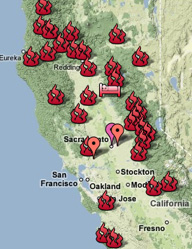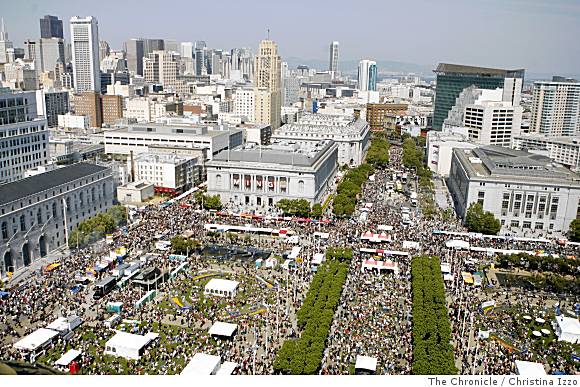Just as learning to live with the threat of nuclear holocaust became the signature of the Cold War generation, learning to live with the threat of climate calamity will be the signature of today's generation.
These fears are similar in scope but their dynamics are different. Fear of a nuclear war was a fear of the future: that tomorrow, or next week, or next year, someone might do something that would result in an exchange of missiles. The point was to prevent that from happening.
The fear of climate calamity is a fear of the past, a past that we cannot go back and redo, and a future over which we may have little control. There is no button that, when pushed or not, will fix the situation.
For example, take today, June 30, 2008, where I live: northern California. According to the Associated Press, the air I breathed today was "an unhealthy stew of smoke and ash."
Right now are currently over 1000 wild fires burning in Northern California. Redwood trees hundreds of years old are going up in smoke. Health authorities have warned everyone from Bakersfield north to Redding to stay indoors. That is a distance of nearly 450 miles. On a map, it looks like this:
Of course, no one actually did stay in doors. In fact, the streets of my hometown San Francisco, look like this:

What will be the consequences, if any, for these hundreds of thousands of queers and their supporters from partying all day in "an unhealthy stew of smoke and ash?"
No one knows.
When will firefighters get these fires under control?
No one knows.
When will the conditions that led to these fires take a turn for the better?
No one knows.
This is the uncertainty that will define life for the current and coming generations.
By now, anyone who has been following climate change research will know that a direct causal relationship between greenhouse gases and the California fires cannot be proven. And there will be some who will insist that this uncertainty marks the end of the discussion. No proof of direct causal connection = end of story. But as research continues as observational data of climate change in motion accumulates, this uncertainty fades in importance and very different sort of uncertainty comes to the fore.
The big news in climate science in recent years has been the increasing awareness of the importance of feedback mechanisms in climate change. We know that global climate changed feeds on itself in ways that we do not fully understand now and cannot accurately predict. Climate change turns out to be highly non-linear. In plain English, that means that the rate of climate change in the immediate past may not tell us much about the rate of change in the future. As feedback processes kick in, the rate may accelerate. It is for this reason that, over the last 20 years, climate scientists have had to continually revise their "worst case scenarios" as insufficiently dire.
The result is a creepy uncertainty that will hereafter hang like a cloud over climate events, from wildfires in California to flooding along the Mississippi to tornados on the Great Plains. None of these things are new, they have all happened before. People accept that as part of the pattern of weather with which we and our parents and our grandparents are familiar. From here on out, every weather calamity will arrive in a wrapper of unspoken dread: what if this event does not fit the old pattern? What if this event marks the opening of a new pattern which we cannot now know and may disrupt much about our lives?
This is the new fear, the fear that will mark this generation and those to come.